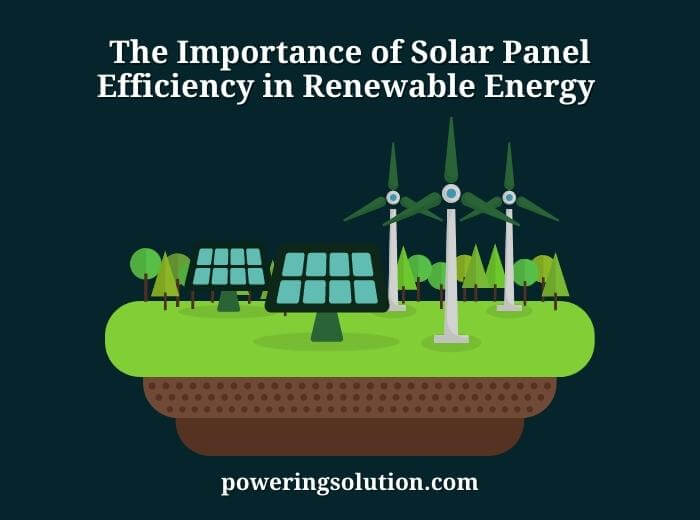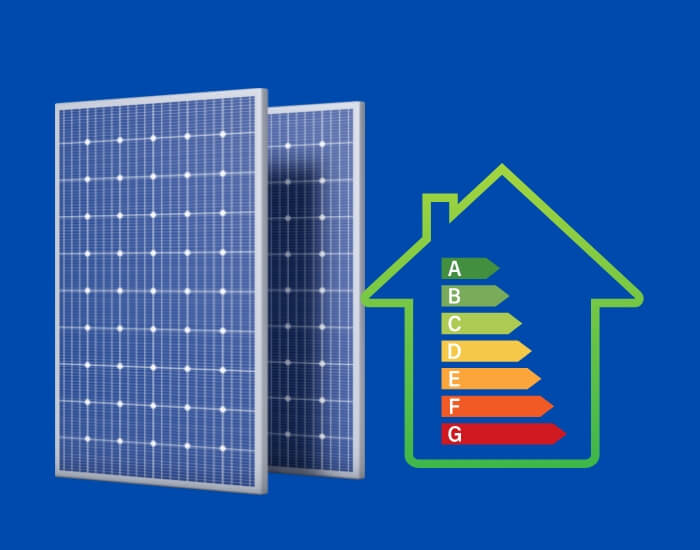The world’s increasing energy demand, coupled with the alarming impact of greenhouse gas emissions on the environment, has led to the rapid growth of renewable energy sources, particularly solar energy. Solar energy is a clean and renewable source of energy that is readily available and inexhaustible. The use of solar panels has become increasingly popular in recent years, as it is one of the most efficient ways of harnessing solar energy.

One of the most critical aspects of solar panel technology is efficiency. Solar panel efficiency is defined as the amount of energy that a solar panel can convert from sunlight into usable electricity. The more efficient a solar panel is, the more electricity it can generate from the same amount of sunlight, which translates to more cost savings, less dependence on non-renewable energy sources, and a reduced carbon footprint.
The purpose of this article is to explore the importance of solar panel efficiency in renewable energy. We will discuss the various factors that influence solar panel efficiency, the benefits of high efficiency, and the latest trends and projections for solar panel technology. By the end of this article, readers will have a better understanding of why solar panel efficiency is critical to the future of renewable energy and the environment.
What is Solar Panel Efficiency?
Solar panel efficiency refers to the amount of energy that a solar panel can convert from sunlight into usable electricity. Solar panels are made up of solar cells that are designed to capture the energy from the sun and convert it into usable electrical energy. The efficiency of a solar panel is determined by how much sunlight it can convert into electricity, and this is expressed as a percentage.
The efficiency of solar panels can vary depending on a variety of factors such as the type of solar cell used, the quality of materials used, and the conditions under which the solar panel is operating. The most efficient solar panels on the market today can convert as much as 23-24% of the sunlight they receive into usable electricity, while less efficient panels may only convert 15-18% of the sunlight they receive.
It is important to note that solar panel efficiency is not the same as solar panel capacity. Solar panel capacity refers to the maximum amount of power that a solar panel can produce under ideal conditions. Solar panel efficiency, on the other hand, is a measure of how effectively a solar panel can convert sunlight into electricity, and it takes into account the real-world conditions that a solar panel is likely to face, such as temperature changes, shading, and dirt.
The higher the efficiency of a solar panel, the more energy it can produce, which can lead to greater cost savings and a reduced carbon footprint. Therefore, it is important to consider the efficiency of a solar panel when deciding which type of solar panel to use for a particular application.
Why Does Solar Panel Efficiency Matter?
Solar panel efficiency is a crucial factor to consider when evaluating the effectiveness of solar energy systems. There are several reasons why solar panel efficiency matters:
More efficient solar panels generate more electricity: The primary benefit of high-efficiency solar panels is that they generate more electricity than less efficient panels. This means that for the same amount of sunlight, a high-efficiency solar panel will produce more electricity than a low-efficiency panel. This is important because it can help to reduce the number of solar panels needed to meet a given energy demand, which can ultimately lead to cost savings.
Increased cost savings: The more electricity a solar panel generates, the more money it can save the consumer. Higher-efficiency solar panels can help reduce energy bills by generating more electricity from the same amount of sunlight, thus reducing the dependence on non-renewable energy sources.
Reduced carbon footprint: Using solar panels with higher efficiency can help reduce the carbon footprint of a building or household. This is because less energy is required from non-renewable sources, which in turn reduces greenhouse gas emissions.

Space saving: Higher efficiency solar panels require less space to generate the same amount of electricity. This means that installations of high-efficiency solar panels can be smaller and more compact, making them more practical for use in urban areas and locations where space is limited.
Long-term investment: Solar panel efficiency is an important factor when considering the long-term investment of a solar energy system. High-efficiency solar panels generally have a longer lifespan, which means that they will continue to produce electricity at a high rate for many years.
Factors Influencing Solar Panel Efficiency
There are several factors that influence the efficiency of solar panels. Understanding these factors can help individuals and organizations choose the most efficient solar panels for their specific needs. Here are some of the key factors that impact solar panel efficiency:
Type of solar cell: There are different types of solar cells, including monocrystalline, polycrystalline, and thin-film. Monocrystalline solar cells are typically the most efficient, with conversion rates of up to 24%. Polycrystalline solar cells are less efficient, with conversion rates of around 15-20%. Thin-film solar cells are the least efficient, with conversion rates of around 10-12%.
Quality of materials: The quality of materials used in the manufacturing of solar panels can also impact efficiency. Higher-quality materials typically result in higher efficiency. For example, high-quality silicone can help improve the efficiency of a solar panel by reducing energy loss through heat.
Temperature: Solar panel efficiency is affected by temperature changes. High temperatures can reduce the efficiency of solar panels, which is why solar panels are typically installed with ventilation to dissipate heat.
Shading: Shading can significantly impact solar panel efficiency. When a solar panel is shaded, even partially, it can significantly reduce the amount of energy it produces. For this reason, it is important to install solar panels in areas where they will receive maximum sunlight exposure throughout the day.
Tilt and orientation: The angle and orientation of solar panels can impact efficiency. Solar panels that are installed at an optimal angle and orientation towards the sun will receive the maximum amount of sunlight, which can improve their efficiency.
Dirt and debris: Dirt and debris on solar panels can reduce their efficiency by blocking sunlight from reaching the solar cells. For this reason, it is important to regularly clean solar panels to ensure maximum efficiency.
The Future of Solar Panel Efficiency
The future of solar panel efficiency is promising, with new technologies and advancements being developed to improve the efficiency of solar panels. Here are some of the key developments and trends in the future of solar panel efficiency: One key development is the use of perovskite solar cells, which have shown the potential to significantly increase solar panel efficiency. These cells have achieved efficiency levels of over 25%, exceeding traditional silicon-based solar panels. Additionally, advancements in nanotechnology and quantum-dot technology are also contributing to increasing solar panel efficiency. These developments hold great promise for the future of solar energy, as they could potentially make solar power even more cost-effective and widely accessible.
- Perovskite solar cells: Perovskite solar cells are a type of solar cell that uses a unique material called perovskite to convert sunlight into electricity. Perovskite solar cells have shown great promise in laboratory tests, with efficiency rates of over 25%. This is comparable to the most efficient monocrystalline silicon solar cells currently on the market. However, perovskite solar cells are still in the research and development stage, and more work is needed to make them commercially viable.
- Bifacial solar panels: Bifacial solar panels are solar panels that can absorb sunlight from both sides, increasing the efficiency of the panel. These panels can be installed in areas where there is a significant reflection of sunlight, such as snow-covered ground or water. Bifacial solar panels are becoming more popular, and are expected to become more widely used in the future.
- Concentrated solar power (CSP): Concentrated solar power is a technology that uses mirrors or lenses to focus sunlight onto a small area, which then heats up a fluid that is used to generate electricity. This technology has the potential to achieve very high-efficiency rates and is being used in large-scale solar power plants in some parts of the world.
- Improved manufacturing techniques: As manufacturing techniques for solar panels continue to improve, it is expected that solar panels will become more efficient and cost-effective. New manufacturing techniques, such as 3D printing, are being developed to create more efficient solar cells.
- Integrated solar systems: There is a trend toward integrating solar panels into building materials, such as roofing shingles, windows, and walls. These integrated solar systems are expected to become more efficient and cost-effective in the future.
As these technologies become more widely available, it is expected that solar energy will become an increasingly important source of renewable energy, helping to reduce reliance on non-renewable energy sources and mitigate the impacts of climate change.
Wrap Up
Solar panel efficiency is a critical factor to consider when investing in renewable energy. The efficiency of a solar panel determines the amount of energy it can generate from sunlight, making it a key consideration when choosing a solar panel. Factors that influence solar panel efficiency include the type of solar cell, the quality of materials, temperature, shading, tilt and orientation, and dirt and debris.
The future of solar panel efficiency looks promising, with new technologies such as perovskite solar cells, bifacial solar panels, concentrated solar power, improved manufacturing techniques, and integrated solar systems being developed to improve efficiency and cost-effectiveness.
As these technologies become more widely available, solar energy is expected to become an increasingly important source of renewable energy, helping to reduce reliance on non-renewable energy sources and mitigate the impacts of climate change.
